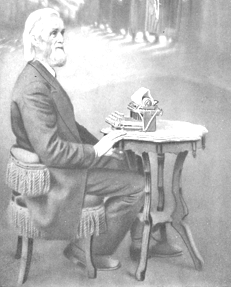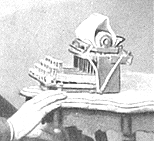|
Christopher Sholes
|
|
|
|
 The man primarily
responsible for developing the first commercially successful typewriter was
Christopher Latham Sholes, together with his associates Carlos Glidden
and Samuel Soule. Sholes, Glidden and Soule sold their patent
rights to entrepreneur James Densmore who, in turn, signed a manufacturing
deal with Philo Remington of the Remington small arms company. The
machine designed by Sholes and manufactured by Remington went on to adorn
millions of desks all over the world. Yet in this portrait, Sholes is
shown posing not with the large, heavy Remington desk machine but with a
hand-built prototype of a small, lightweight portable typewriter. Whatever
happened to this promising invention? It seems that Remington learned
of Sholes development through Densmore and - as licensees of the primary
typewriter patents- demanded that Sholes hand over the prototype.
Fearing that a small, cheap portable machine would undermine sales of the
Remington desk typewriter, the company decided to suppress the
invention. In the long run, their fears were justified -- in the 1930s
to 1960s it was Smith Corona, Underwood and Royal who largely dominated the
typewriter business with portable machines that sold in tens of
millions. It was not to be until 1920 that Remington decided to take a
hand in the portable market itself, by which time Sholes's ideas for a
portable were long out of date. It is unlikely that we will ever know
its exact specification, but the Sholes Portable appears to be a 4-bank
machine similar in general arrangement to the 1924 Corona and 1926 Underwood
Portable, except that - like all typewriters of the period - it is an
understrike machine whose work would be invisible to the operator. The
one innovation that seems odd to us is what seems to be a lever operated
carriage return (a design that German manufacturer Seidel & Naumann
incorporated into its Ideal desk machine.) Probably the greatest 'What If .
. ?' question in the entire history of the typewriter industry is, 'What if
Remington had manufactured a 4-bank portable in 1890 instead of suppressing
it?' The man primarily
responsible for developing the first commercially successful typewriter was
Christopher Latham Sholes, together with his associates Carlos Glidden
and Samuel Soule. Sholes, Glidden and Soule sold their patent
rights to entrepreneur James Densmore who, in turn, signed a manufacturing
deal with Philo Remington of the Remington small arms company. The
machine designed by Sholes and manufactured by Remington went on to adorn
millions of desks all over the world. Yet in this portrait, Sholes is
shown posing not with the large, heavy Remington desk machine but with a
hand-built prototype of a small, lightweight portable typewriter. Whatever
happened to this promising invention? It seems that Remington learned
of Sholes development through Densmore and - as licensees of the primary
typewriter patents- demanded that Sholes hand over the prototype.
Fearing that a small, cheap portable machine would undermine sales of the
Remington desk typewriter, the company decided to suppress the
invention. In the long run, their fears were justified -- in the 1930s
to 1960s it was Smith Corona, Underwood and Royal who largely dominated the
typewriter business with portable machines that sold in tens of
millions. It was not to be until 1920 that Remington decided to take a
hand in the portable market itself, by which time Sholes's ideas for a
portable were long out of date. It is unlikely that we will ever know
its exact specification, but the Sholes Portable appears to be a 4-bank
machine similar in general arrangement to the 1924 Corona and 1926 Underwood
Portable, except that - like all typewriters of the period - it is an
understrike machine whose work would be invisible to the operator. The
one innovation that seems odd to us is what seems to be a lever operated
carriage return (a design that German manufacturer Seidel & Naumann
incorporated into its Ideal desk machine.) Probably the greatest 'What If .
. ?' question in the entire history of the typewriter industry is, 'What if
Remington had manufactured a 4-bank portable in 1890 instead of suppressing
it?'
|
